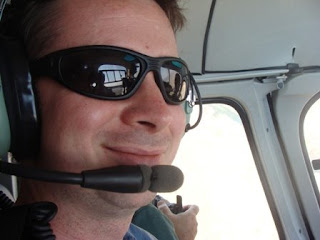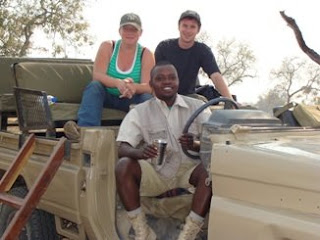On Wednesday we headed out to Kepeshi again, to finish the work on the school classrooms. As last week, we had another team of willing volunteers to help with the painting, and fixing desks. This time we were able to paint the outside of the school too. Last week we painted Patrick's classroom, and it was good to see his class in the classroom, and Patrick very happy to be using his new blackboard. Alice's class had there lessons outside while her classroom was painted.

Photo: Patrick using new board to teach his class

Photo: Alice teaches her class outside

Photo: Some members of the community help to paint the outside of the school

Photo: Fixing desks
In the afternoon, we had a meeting with some of the community in order to discuss how they could fund the school going forward. Many people had ideas on agriculture and ways in which they could grow food to raise money However, there was one sticking point, the initial funds for seed and fertiliser. It’s hard because while the cost is very little for us, around £60, the whole essence about the ‘Life’ programme is that it doesn’t create dependence, and yet people looked at us expectantly because they know we have money. I contemplated the fact that even if a homeless tramp from the UK with no money turned up here in a Zambian village, people would not believe that he could have no money, if his skin was white. I think the concept of there being poor people in the western world, is not one to be grasped very easily over here – If you’re living in the west and especially if you have white skin then you must be rich.
Anyway I digress, after a private discussion with Joel and Vincent, in which I asked if they thought the people were really serious about helping their community. Although I was really just after Vincent and Joel’s opinion, Vincent decided to then translate to everyone there, asking if they were serious, which almost caused a riot as some of the people seemed rather annoyed that their seriousness in the matter was being questioned here. It’s really tough because on the one hand you dont want to continue the dependance which has occurred all over this area, partly from colonial times, but also partly because since independence western charities and NGO’s have kept giving money to build various things, and while this is honourable and has been good in the short term in improving life for people here, it has also had a negative impact on many Zambian’s ability to do things for themselves. They have become so used to the west providing resources, that this has left an unhealthy dependence. I was aware that if they wanted to improve their community and fund the school, then the best way of making sure the school continued to be funded in the future was by them putting the effort in now, and really owning the project; but on the other hand, as we sat there with this group, I was acutely aware of how much richer we are than they, and in a sense, what right do I have to withhold giving money, when much of the reason for the difference in our financial situation has been to do with where we have been born. I suppose as a Christian it's about being a good steward of the money I have been blessed with, and making the decision that is best for the people here. Hmm. I'm not sure I like holding this kind of authority! Anyway Ruth and I agreed that if they prepared some land ready to be cultivated, then we could give a small loan for some seeds and fertiliser. I hope this gift or loan will not continue their dependence on the outside, I hope and pray that they begin to realise that if they work together as a community than they can do great things.

Photo: Meeting
The first task on Thursday was to go and buy some cement for Vincent. His church of 35 members had raised 350,000 Kwacha (about £50) over 6 months, to buy 5 bags of cement to lay as a floor in the church. Currently they just had mud floor, which creates a lot of dust when people walk around. We searched for cement, however although every place said they supplied it, they didn’t actually have any in stock. At this time of year a lot of building work goes on because people are trying to prepare for the rainy season. During the dry season you can afford not to have a roof on your building, or glass in your windows, but you don’t want to have incomplete buildings come the rainy season. Finally, in the seventh place we tried, they had some but wanted a higher price for it than Vincent had hoped for (possibly due to the fact that they were the only shop with cement). I managed to reduce the price slightly with some haggling. (I’ll have to remember not to do this when I return home. I can see some funny looks happening when I try to argue for a lower price.
A little later we arrived in Ipafu, where we met the pastors to discuss how the discipleship programme could go on, and I discussed with them about how they can fund themselves better, and enable them to release more of their time for the work. Only 4 of the pastors came to the meeting. It turned out Casper was quite badly ill, and as the morning went on, it became clear that he would need to be picked up and taken to the clinic in Ipafu. Jude and Jo went with Ranger to pick up Casper and his wife. They found him to be in some degree of pain, with what could be a severe stomach ulcer. At the clinic, they are told that he should take some tablets and go back home, and if not better the next day go to the hospital. Jude managed to convince the medical staff there that because we were here today, he would have transport to go to Chingola hospital, and so they signed the form, which would refer him into the hospital.
Mark Burton a professional photographer and good friend of Jon, has joined us this week. He’s taking some photos of what we’re up to on the ‘Life’ project and also a project taking a number of families over here, and photographing them every 18 months or so, and seeing how their lives change. Mark interviewed some of the pastors to understand a bit more about their lives and what made them tick.
Next time on the blog…..I travel out to Mibila and Milulu with Mark, as he tries to find the families he wants to take photos of for his project.
N.B. We visited Casper in hospital today, and he is still in a lot of pain. Please pray for him.




















